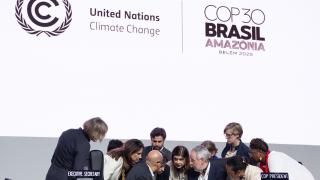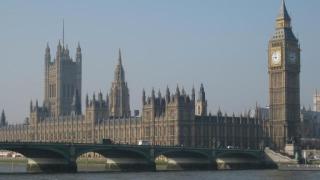On 22 February, UNA-UK's Executive Director, Natalie Samarasinghe, took part in a wide-ranging "Question Time"-style debate organised by UNA Warwick & District Branch, covering Britain's role in today's world, developments in the Middle East and North Africa, international development and the responsibility to protect.
The panel featured Chris White MP (Warwick and Leamington Spa), Phil Bennion MEP (West Midlands), Dr Marwan Darweish (Principal Lecturer in Peace and Reconciliation Studies, Coventry University) and Steve Hucklesby MBE (Policy Advisor on International Relations, Methodist Church and Baptist Union). Questions and comments were pre-submitted and taken from the floor.
Around 70 UNA members, supporters and partners from the Midlands and beyond took part in the event, which was chaired by Gian Clare (UNA Warwick & District Chair and UNA-UK Trustee).
Below are some of the answers provided by the panellists, and comments from participants.
(Photo L-R: Chris White MP, Natalie Samarasinghe, Gian Clare, Phil Bennion MEP, Steve Hucklesby and Dr Marwan Darweish)
What role should Britain play in today's world?
Response by Natalie Samarasinghe: An active one! In 1962, US Secretary of State Dean Acheson commented that Britain had lost an empire but not yet found a role. Fifty years on, this question continues to occupy people in this country, even more so in recent years. On the economic, military and development fronts, there is a sense that we must learn to do more with less, and sometimes do less altogether. But we ought to remember that the UK is still a powerful country by most measures and an influential one too.
It is uniquely positioned in global affairs, with a seat at the UN Security Council, within the EU, the Commonwealth and as an aid donor. We at UNA-UK believe the UK can leverage these relationships to provide leadership - the Foreign Secretary's Preventing Sexual Violence initiative is a good example; to set a positive example - through constructive engagement with the UN system for instance; and as a convenor of states. The UK played a crucial role in building the international system we have so perhaps unsurprisingly, it is good at working it. We all could gain from a more active UK on the world stage.
Why is Israel allowed to demolish Palestinian houses on Palestinian land, and why is there no progress on resolving issues in the West Bank?
Response by Dr Marwan Darweish: There are about 600,000 settlers live in the settlements in the West Bank, in fact, I will call them colonies. There are two categories of settlers: a) those who come to live in the West Bank for religious and ideological reasons, believing that the land given to them by God and the Palestinians should leave, and b) those who came to live in the West Bank for economic reasons. It is cheaper for them to live in the West Bank because land and houses are subsidised by the Israeli Government.
60% of the West Bank is under total Israeli control - this area known as Area C - and Israeli forces have military control in other areas too. They control the borders, travel, water resources, sky and other areas of life. They can do whatever they want in the occupied territories of the West Bank. Just recently, the Israeli army stopped the convoy of the Palestinian Prime Minister. The continuation of the occupation is in violation of successive UN resolutions, the Geneva Conventions and wider international humanitarian law. Palestinian farmers suffer daily attacks and have their lands confiscated. Up to now, more the 2.5 million olive trees been damaged, vandalised or totally cut.
Was there ever an Arab Spring?
Response given by Steve Hucklesby MBE: We are talking about complex societies across the Middle East and we should not expect new forms of governance to materialise overnight. Transformation will not be like the fall of the Berlin Wall. As people move away from authoritarian rule they will need to work out how to manage sectarian divisions. It is very easy for individuals who want gain a powerbase to do so by claiming to represent a particular clan or religious affiliation and to resort to fear-mongering. This can create problems between groups in society where previously there was tolerance and respect. It creates problems for Christians and other members of minority faiths in the region.
One positive lesson that Tunisia offers us is the importance of strong broad-based civil society organisations such as trade unions and women’s associates that span ethic or other identities. The strength of these organisations in Tunisia has resulted in a new constitution, just recently passed, that is probably more progressive in the Middle East in terms of providing equal rights for women and in promoting equality under law.
Response given by Phil Bennion MEP: Looking at the situation in Egypt now, we might doubt that the Arab Spring was ever a reality and many pundits now refer to an "Arab Winter". Their pessimism is understandable as the removal of Egypt's President Morsi was indeed a coup d'état and the Mubarak regime has effectively been restored under a different figurehead. However, if we look a little deeper we see a more complex reality. The Morsi government made mistakes in failing to be inclusive, thereby alienating the secular liberals who could have been allies. The new Egyptian constitution does not preclude a democratic future, but the Muslim Brotherhood must be re-engaged into this process.
We can be more optimistic of a lasting 'Arab Spring' effect if we look at Tunisia, where a secular and liberal constitution has just been signed off under a moderate Islamist government. Tunisia has had its problems with political assassinations and its own extreme Salafist movement. Nevertheless the country has come through the reform process, largely due to the wisdom of Rachid al Ghannouchi, the guiding force behind the governing En-Nahda party, who I had the privilege to meet two years ago. Unfortunately Egypt has lacked such a figure, but I am still optimistic that the spirit of Tahrir Square will eventually deliver the reforms that Egypt needs.
During the debate, Chris White MP responded to a question on the UK and international development: One of the most important ways in which both the UK and the world can measure their contribution to international development is through monitoring of the UN Millennium Development Goals.
"I am proud to say that the UK has played a significant role in furthering the MDGs, and is on track to meeting its own development commitments. Some targets have been met ahead of the 2015 deadline, including the target for sustainable sources of improved drinking water, and the target for extreme poverty reduction – both of which have been reached five years ahead of schedule.”
Some comments on the event:
- "For an hour and a half, a packed audience was able to question a very knowledgeable panel, ably chaired by Gian Clare (Chair of UNA Warwick) ... While the panellists were not always able provide optimistic responses, they were able to cogently explain the background to these world problems. Perhaps the most refreshing aspect of the discussions was that – quite unlike any BBC Question Times – the speakers looked for consensus between themselves rather than trying to score political points!" - Malcolm Hancock, former Chair of Mid-Warwickshire Amnesty International
- "It was refreshing to have an in-depth and cross-party discussion about international issues with such a well-informed audience. I thought that the Question Time was a success - I certainly enjoyed it and was impressed by the scope of knowledge and commitment to internationalism amongst UN Association members" - Phil Bennion MEP
- "The speakers gave a good account of the real issues which concern all of us" - Jane Knight, Labour Councillor
- "I thought the session was one of the best meetings we have had, both in terms of content and numbers attending. You assembled an excellent group of panellists who really knew their stuff and there were some good questions. I was particularly impressed with the MEP who gave us a balanced view of the inner workings of the EU. Hope we have another similar session before too long" - Julie Bradley, UNA-UK member and former aid/development worker






